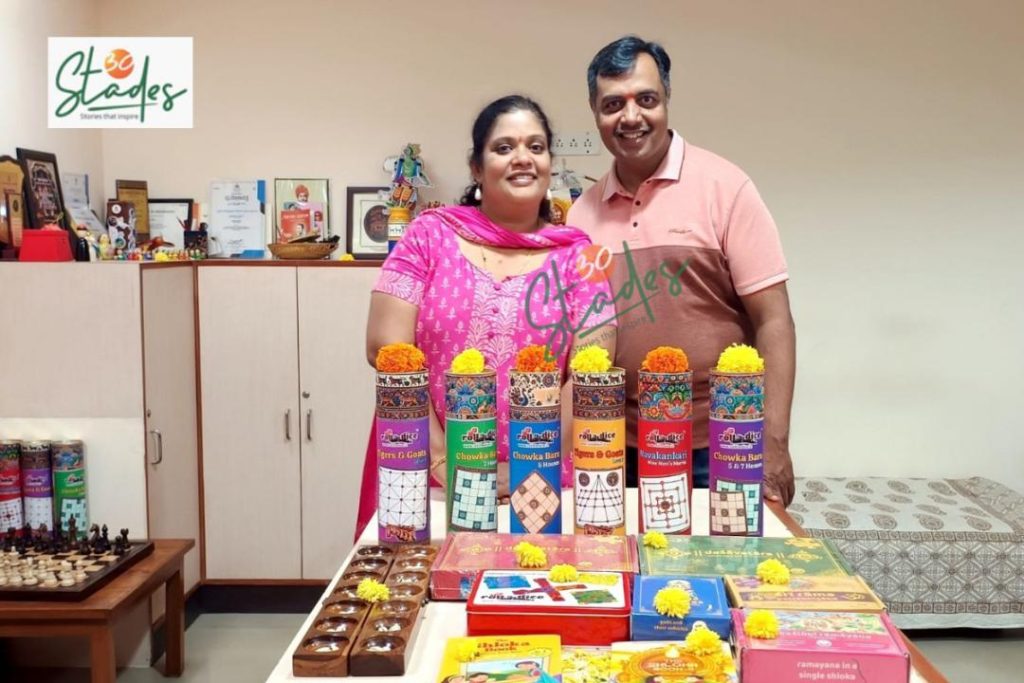
B’luru Engineer Couple Quit Jobs to Revive Traditional Board Games
In a remarkable tale of pursuing passion over profit, a software engineer couple in Bangalore has taken the bold step of quitting their high-paying jobs to revive ancient board games that were once cherished by the royals and commoners alike. Shashishekhar S and Tanushri, both engineers in their mid-30s, have dedicated themselves to converting traditional game patterns etched on temple floors and walls into eco-friendly, handcrafted, and portable board games. These games not only promote strategic thinking and problem-solving but also connect people of all ages with India’s rich cultural heritage.
The couple’s journey began when they stumbled upon ancient temple floors and walls adorned with intricate game patterns. Intrigued by these designs, they started researching the history and significance of these games. They discovered that many of these games were once played by both royals and commoners, promoting social bonding and community building. As they delved deeper, they realized that these games were not only a reflection of India’s cultural diversity but also an excellent way to develop critical thinking, problem-solving, and strategic skills.
The couple’s decision to quit their jobs was not an easy one. Shashishekhar, who was working for a leading IT firm, was earning a six-figure salary, while Tanushri was a software engineer at a prestigious tech company. However, as they continued to explore the world of traditional board games, they became increasingly passionate about reviving these ancient pastimes. They realized that their skills in software engineering could be applied to create modern, eco-friendly, and portable versions of these games.
With their savings and a small loan, the couple started their venture, naming it “Mehfil” – a Sanskrit word that means “gathering” or “meet”. They spent several months researching, designing, and creating their first few games, including “Chaturanga” and “Pachisi”. Chaturanga, a game that dates back to the 6th century, is an ancient precursor to modern-day chess. Pachisi, on the other hand, is a game of strategy and skill that was once played by royal courts.
The couple’s hard work paid off when their games started gaining popularity. They began selling their products at local craft fairs and online marketplaces, and soon, orders started pouring in from around the world. Today, Mehfil is a thriving business, with the couple earning a monthly income of over Rs 2 lakh.
The success of Mehfil is not only a testament to the couple’s entrepreneurial spirit but also a reflection of India’s growing interest in preserving traditional arts and crafts. As the couple’s games gain popularity, they are also creating a sense of community among players. People of all ages are coming together to play these games, share stories, and learn about India’s rich cultural heritage.
In an interview with 30stades, Shashishekhar and Tanushri spoke about their journey and the inspiration behind their venture. “We wanted to do something that would bring people together, promote cultural exchange, and preserve India’s traditional knowledge. Board games are an excellent way to achieve this, as they promote social bonding, strategic thinking, and problem-solving,” said Shashishekhar.
Tanushri added, “Our games are not just about entertainment; they are also an excellent way to connect with our heritage. We are proud to be part of a movement that is promoting cultural revival and community building.”
As Mehfil continues to grow and flourish, Shashishekhar and Tanushri are now working on creating new games and expanding their product line. They are also planning to collaborate with museums, cultural institutions, and educational centers to promote the importance of traditional board games in Indian culture.
The story of Shashishekhar and Tanushri serves as a powerful reminder that success is not just about earning a high salary or achieving professional milestones. It is also about pursuing one’s passion, contributing to society, and leaving a lasting legacy.






